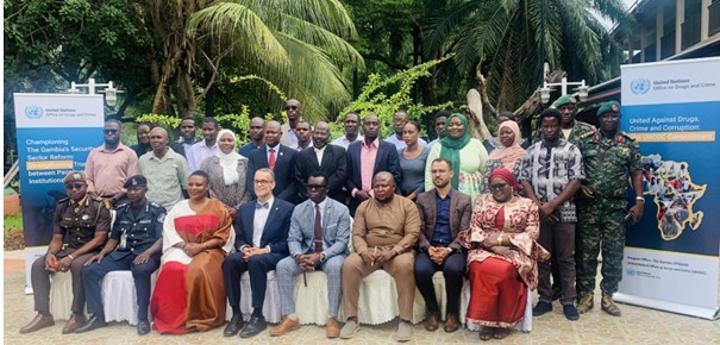Africa-Press – Gambia. The United Nations Office on Drugs and Crime (UNODC) on Tuesday convened a 2 days stakeholder engagement on Security Sector Reform (SSR) in The Gambia.
Held at Senegambia Beach Hotel, the meeting was organised under the theme “Enhancing knowledge and strengthening partnerships on Security Sector Reform in The Gambia”.
Recognising the important role the SSR plays in the country’s peace and stability, the United Nations Peacebuilding Fund (UNPBF) approved a 36-month joint project entitled “Sustaining The Gambia’s Peaceful Transition by Supporting the Implementation of the Security Sector Reform Strategy”.
This initiative is jointly implemented by UNDP, OHCHR, and UNODC in partnership with the government. It addresses critical gaps in security sector governance, including vulnerable oversight mechanisms, insufficient gender mainstreaming, and limited institutional capacities.
The UNPBF SSR Project prioritises inclusive, participatory, and accountable reform processes that integrate gender and human rights considerations. The project’s interventions aim to strengthen institutional frameworks, enhance civilian oversight, and improve the operational capacity of security and justice actors.
The overall objective of the event is to enhance knowledge, strengthen partnerships, and promote coordinated action among security sector actors for the effective implementation of the UNPBF SSR Project in The Gambia.
Karl Fredrick Paul, the UN Country Coordinator, highlighted that the SSR is one of the most critical Transitional Justice (TJ) reform pillars, which is designed to realign the security institutions to be accountable under a democratic civil authority and rule of law.
He stressed that it is part of the UN’s commitment to contribute to the 2030 Agenda for Sustainable Development, including SDG 5 on Gender Equality and Sustainable Development Goal 16 on Peace, Justice, and Strong Institutions.
“The concept of this meeting is bringing key actors together to prioritise and strategise priority interventions to drive the SSR agenda but also to share experiences and lessons learnt from other countries in the region. It emphasise the importance of the regional context on the country’s SSR process, especially the worrying increase in military coups and other forms of unconstitutional changes of government,” he said.
Mr Fredrick Paul also reiterated the continued unwavering commitment of the UN in The Gambia to support the government and Gambians to develop effective, inclusive, and accountable security institutions that contribute to national and regional security and sustainable development.
Mulay CFA Colley, from the Office of the National Security, said with the support of UNODC and other partners, ONS has been actively engaged in advancing legal and policy frameworks, including the drafting and review of key instruments such as the National Security Council Bill, revisions to the armed forces and prisons Acts, and the development of a gender policy for the security institutions.
“These reforms are vital in ensuring that the security sector is not only professional and responsive but also anchored in international norms and aligned with the aspirations of the Gambian people.”
This stakeholder engagement, Colley added, is a pivotal moment in that journey.
“It provides us with a platform to build a common understanding of the project’s objectives to share experiences from our region, and to generate recommendations that will strengthen coordination and accountability.”
He said the convening of representatives from government institutions, oversight bodies, civil society, academia, and the media, embodies the principle that reform cannot be the responsibility of a few but must be owned and driven collectively.
“We must not shy away from addressing the hard truths of our past, for it is only by doing so that we can rebuild institutions that are trusted in the present and resilient for the future,” Colley added.
For More News And Analysis About Gambia Follow Africa-Press






